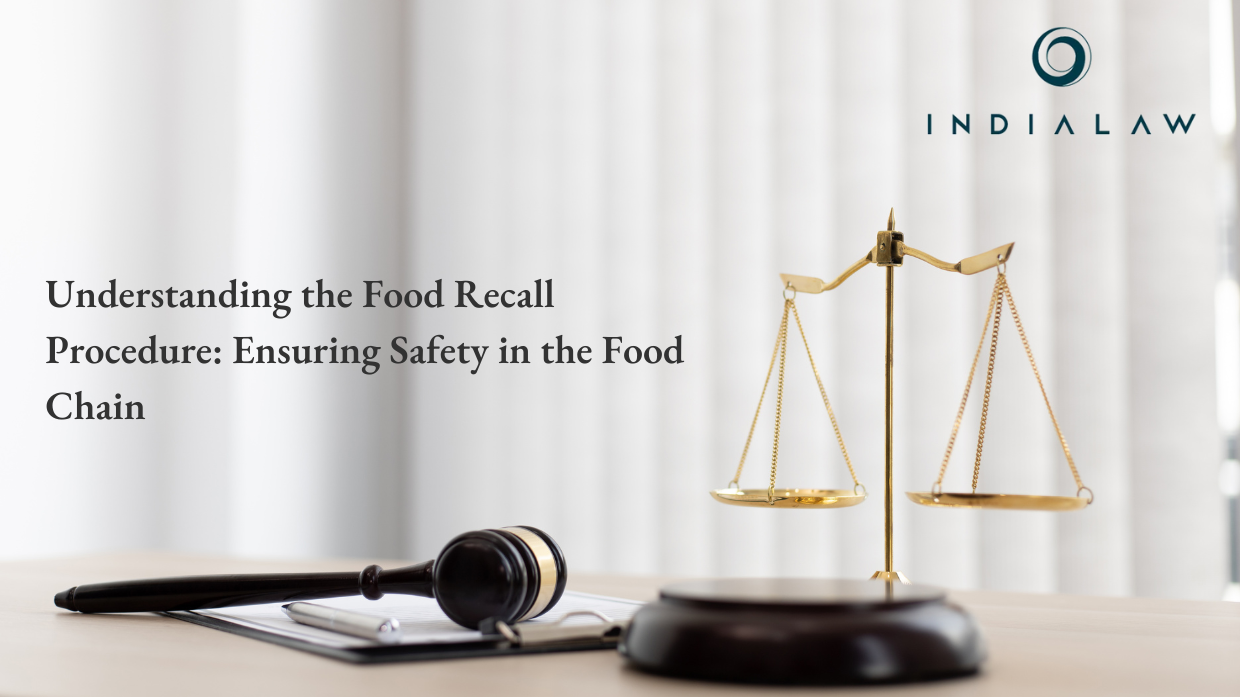Understanding the Food Recall Procedure: Ensuring Safety in the Food Chain

The Food Safety and Standards (Food Recall Procedure) Regulations, 2017, provide a crucial framework for managing food recalls in India. Under Section 28 of the Food Safety and Standards Act, 2016 (FSSA, 2016), these regulations delineate the procedures and requirements necessary to effectively remove food products from the market, ensuring consumer safety and public health.
Table of Contents
The Importance of Food Recall Procedures
Food recalls may be initiated for various reasons, including inadvertent contamination by harmful substances, the presence of foreign objects such as broken glass or metal fragments, or violations of product labelling regulations. While food recalls are often voluntarily initiated by Food Business Operators (FBOs), regulatory authorities possess the power to mandate a recall under Regulation 5 of the Recall Regulations. This authority also extends to imported foods, ensuring comprehensive safety measures across the food supply chain.
The recall procedure is not only about removing unsafe products from the market; it also emphasizes the importance of communication. It ensures that consumers are promptly informed about the recall, allowing them to take necessary precautions. Additionally, it mandates that food under recall is either retrieved, destroyed, or reprocessed to mitigate risks to public health.
Initiating a Food Recall
A recall can be prompted by various triggers. If a complaint or report arises from any stakeholder, the FBO is obligated to assess the situation. Should the FBO fail to respond adequately, the complainant has the right to escalate the issue to the Chief Executive Officer (CEO) of the Food Safety and Standards Authority of India (FSSAI) or the state/union territory’s Commissioners of Food Safety. These authorities can then instruct the FBO to carry out a recall if deemed necessary.
Moreover, a recall may be initiated based on findings from analysis reports generated by surveillance or regulatory samples. If these reports declare a food product unsafe or in violation of the FSSA, 2016, the authorities may mandate a recall to protect public health.
The Role of Food Business Operators
All FBOs engaged in the manufacturing, importation, or wholesale distribution of food must maintain an up-to-date recall plan. This plan serves as a formal procedure to retrieve food products from the market when a recall is necessary. Notably, restaurants, caterers, and takeaway businesses are exempt from having a recall plan unless they operate multiple outlets with integrated manufacturing and distribution networks.
FBOs are responsible for tracking the distribution of their food products and must collaborate with regulatory authorities to mitigate risks associated with the specific batch or lot under recall. Upon notification from the FSSAI or relevant authorities, all food subject to recall must be removed from circulation across all sales and distribution channels.
Informing Consumers
Communication is a critical component of the food recall process. FBOs are required to inform consumers in affected areas through press releases, written communications, or advertisements that clearly identify the information as a “Food Recall Notice.” This notice should contain all necessary details as mandated by the regulations, ensuring consumers are well-informed and able to act appropriately.
Handling Recalled Food Products
Once a recall is initiated, retrieved food products must be collected at a central site. In cases where the recalled items are distributed over a wide geographical area, the FBO may establish multiple recovery sites. If the recall is due to labelling violations or other non-safety issues and the products are otherwise fit for consumption, they may be resold after necessary corrections or reprocessing, contingent upon permission from the CEO of the FSSAI.
However, any food that is deemed unfit for human consumption must be disposed of by the FBO in consultation with the CEO of the FSSAI. It is essential for FBOs to maintain detailed records of such disposals to ensure accountability and traceability.
Imported Food Products and International Standards
In cases of imported foods that are recalled in other countries or Indian products that are rejected during export, FBOs may also be required to dispose of or reprocess these items upon their return to India. The FSSAI, along with state Food Safety Commissioners, plays a critical role in reviewing the recall plans for exported foods and advising health authorities in the importing countries accordingly.
Conclusion
The Food Safety and Standards (Food Recall Procedure) Regulations, 2017, represent a comprehensive approach to safeguarding public health by establishing clear guidelines for food recalls. From the responsibilities of FBOs to the protocols for informing consumers, these regulations ensure that food products are monitored, controlled, and handled with the utmost care. The emphasis on communication and accountability reinforces the commitment to maintaining safety across the food supply chain.
For more information please contact us at rahul.sundaram@indialaw.in
By entering the email address you agree to our Privacy Policy.



